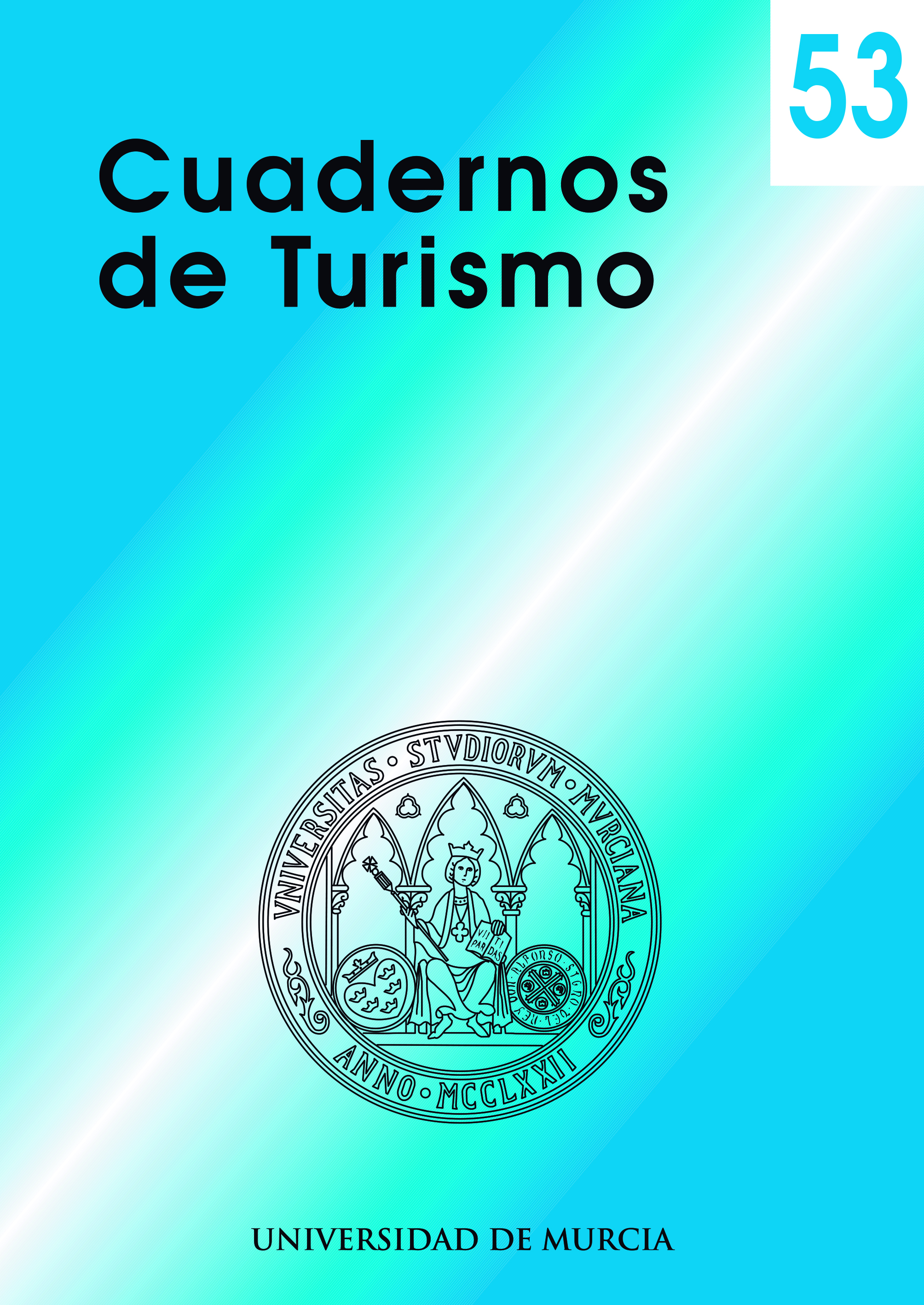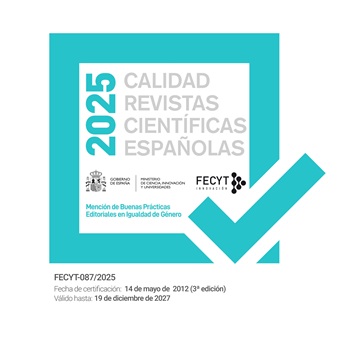CIBERSEGURIDAD EN LA INVESTIGACIÓN EN TURISMO Y HOTELERÍA: TEMAS DE ACTUALIDAD, TENDENCIAS Y UNA AGENDA PARA FUTURAS INVESTIGACIONES
Agencias de apoyo
- This work was supported by the: Spanish Ministry of Universities, Recovery, Transformation and Resilience Plan, and the Autonomous University of Madrid under Grant CA2/RSUE/2021-00659; Chinese Ministry of Science and Technology and the University of Science and Technology of China, Hefei City, P.R.China under Grant DL2023200001L.
Resumen
Este artículo compara dos revisiones bibliográficas sobre cuestiones de ciberseguridad centradas en el ámbito de las empresas y la gestión empresarial, por una parte, y en el sector del turismo y la hostelería por otra. De este modo, se utiliza el estudio general en el ámbito empresarial como punto de referencia para el análisis sobre el sector del turismo, con el fin de trazar las tendencias actuales e identificar las lagunas existentes. Los resultados sugieren los siguientes temas para futuras investigaciones: (1) aprendizaje automático, inteligencia artificial, blockchain y big data; (2) fraude y reputación; (3) phishing e ingeniería social; (4) seguridad y educación.
Descargas
-
Resumen1322
-
PDF 1070
-
PDF1070
Citas
ARIA, M. and CUCCURULLO, C. (2017): «Bibliometrix: An r-tool for comprehensive science mapping analysis », Journal of Informetrics, vol. 11 (4), pp. 959-975, https://doi.org/10.1016/j.joi.2017.08.007
BILEFSKY, D. (2017): «Hackers use new tactic at Austrian hotel: locking the doors», The New York Times, available at: www.nytimes.com/2017/01/30/world/europe/hotel-austria-bitcoin-ransom.html?_r=0 (accessed 31October 2023).
BORNMANN, L., MUTZ, R., NEUHAUS, C. and DANIEL, H. (2008): «Citation counts for research evaluation: standards of good practice for analyzing bibliometric data and presenting and interpreting results», Ethics in Science and Environmental Politics, vol. 8, pp. 93-102.
BOTO-GARCÍA, D. (2023): «Hospitality workers' awareness and training about the risks of online crime and the occurrence of cyberattacks», Journal of Hospitality and Tourism Management, vol. 55, pp. 240-247.
BOYSON, S., CORSI, T.M., and PARASKEVAS, J.P. (2022): «Defending digital supply chains: Evidence from a decade-long research program», Technovation, vol.118, p.102380.
BUTLER, J. (2016): «Not just heads in beds-cybersecurity for hotel owners», Hospitality Net, available at: www.hospitalitynet.org/opinion/4073687.html (accessed 31 October 2023):
CHEN, H. S. and FISCUS, J. (2018): «The inhospitable vulnerability: A need for cybersecurity risk assessment in the hospitality industry», Journal of Hospitality and Tourism Technology, vol. 9 (2), pp. 223-234.
CHEN, J., HENRY, E. and JIANG, X. (2023): «Is cybersecurity risk factor disclosure informative? Evidence from disclosures following a data breach», Journal of Business Ethics, vol. 187 (1), pp.199-224.
DELGADO LÓPEZ-CÓZAR, E., ROBINSON-GARCÍA, N. and TORRES-SALINAS, D. (2014): «The Google scholar experiment: how to index false papers and manipulate bibliometric indicators», Journal of the Association for Information Science and Technology, vol. 65, pp. 446-454.
DENYER, D. and TRANFIELD, D. (2009): «Producing a systematic review», in D. A. Buchanan, A. Bryman (Eds.), The SAGE handbook of organizational research methods, pp. 671–689.
FRANCESCHINI, S., FARIA, L.G.D. and JUROWETZKI, R. (2016): «Unveiling scientific communities about sustainability and innovation. A bibliometric journey around sustainable terms», Journal of Cleaner Production, vol. 127, pp. 72-83.
FRANK, M.L., GRENIER, J.H., PYZOHA, J.S. and ZIELINSKI, N.B. (2023): «Implications of enhanced cybersecurity risk management reporting and independent assurance», Current Issues in Auditing, vol. 17 (1), pp. 11-18.
FUSI, F., JUNG, H. and WELCH, E. (2023): «Technological vulnerability and knowledge of cyber-incidents: Threats to innovativeness in local governments?», Public Management Review, p. 1-27. https://doi.org/10.1080/14719037.2023.2250362
GIGLIO, C., CORVELLO, V., CONIGLIO, I.M., KRAUS, S. and GAST, J. (2023a): «Cooperation between large companies and start-ups: An overview of the current state of research», European Managment Journal. https://doi.org/10.1016/j.emj.2023.08.002
GIGLIO, C., VOCATURO, G.S. and PALMIERI, R. (2023b): «A scientometric study of LCA-based industrialization and commercialization of geosynthetics in infrastructures», Applied Sciences, vol. 13 (4), p. 2328. https://doi.org/10.3390/app13042328
GIUSTINI, D. and KAMEL BOULOS, M.N. (2013): «Google Scholar is not enough to be used alone for systematic reviews», Online Journal of Public Health Informatics, vol. 5 (2), p. 214.
GWEBU, K., and BARROWS, C. W. (2020): «Data breaches in hospitality: is the industry different?», Journal of Hospitality and Tourism Technology, vol. 11 (3), pp. 511-527.
INCIBE (2023): Instituto Nacional de Ciberseguridad. Sala de Prensa. https://www.incibe.es. Revised on 30 October, 2023.
KOUSHA, K. and THELWALL, M. (2007): «Sources of Google Scholar citations outside the science citation index: a comparison between four science disciplines», Scientometrics, vol. 74 (2), pp. 273-294.
KRAUS, S., BREIER, M., LIM, W.M. et al. (2022): «Literature reviews as independent studies: guidelines for academic practice», Review Managing Science, vol. 16, pp. 2.577-2.595.
LASDA BERGMAN, E.M. (2012): «Finding citations to social work literature: the relative benefits of using web of science, Scopus, or Google scholar», The Journal of Academic Librarianship, vol. 38 (6), pp. 370-379.
LASO, P.M., SALMON, L., BOZHILOVA, M., IVANOV, I., STOIANOV, N., VELEV, G., CLARAMUNT., C. and YANAKIEV, Y. (2022): «ISOLA: An innovative approach to cyber threat detection in cruise shipping», in Developments and Advances in Defense and Security: Proceedings of MICRADS 2021. Singapore, Springer, pp. 71-81.
LOHRKE, F.T. and FROWNFELTER-LOHRKE, C. (2023): «Cybersecurity research from a management perspective: A systematic literature review and future research agenda», Journal of General Management, p. 03063070231200512. https://doi.org/10.1177/03063070231200512
MOHER, D., LIBERATI, A., TETZLA, J. and ALTMAN, D.G. (2009): «Preferred reporting items for systematic reviews and meta-analyses: The prisma statement», Annals of Internal Medicine, vol. 151, pp. 264-269, https://doi.org/10.7326/0003-4819-151-4-200908180-00135
PAGE, M. J., MCKENZIE, J. E., BOSSUYT, P. M., BOUTRON, I., HOFFMANN, T.C., MULROW, C. D., SHAMSEER, L., TETZLA, J. M., AKL, E. A., BRENNAN, S. E., CHOU, R., GLANVILLE, J., GRIMSHAW, J. M., HRÓBJARTSSON, A., LALU, M. M., LI, T., LODER, E. W., MAYO-WILSON, E., MCDONALD, S., … MOHER, D. (2021): «The prisma 2020 statement: An updated guideline for reporting systematic reviews», BMJ, vol. 372 (71), https://doi.org/10.1136/bmj.n71
PARASKEVAS, A. (2022): «Cybersecurity in travel and tourism: A risk-based approach», in Handbook of e-Tourism. Cham, Springer International Publishing, pp. 1.605-1.628.
PARSONS, F.J., PANTRIDGE, M.J. and FLAHERTY, G.T. (2021): «Cybersecurity risks and recommendations for international travellers», Journal of Travel Medicine, vol. 28 (8), pp. 1-4.
PITTAWAY, L., ROBERTSON, M., MUNIR, K., DENYER, D. and NEELY, A. (2004): «Networking and innovation: A systematic review of the evidence», International Journal of Management Reviews, vol. 5-6 (3-4), pp.137-168.
ROY, G.D. (2022): «Digital privacy concerns in India for medical tourism», Journal of Public Affairs, vol. 22, p. e2762.
SAHU, A.K. and GUTUB, A. (2022): «Improving grayscale steganography to protect personal information disclosure within hotel services», Multimedia Tools and Applications, vol. 81 (21), pp. 30.663-30.683.
SCHIEDERIG, T., TIETZE, F. and HERSTATT, C. (2012): «Green innovation in technology and innovation management: an exploratory literature review», RandD Management, vol. 42, pp. 180-192.
SECURITY (2023): «Travel and tourism sector ranked third in cyberattack incidents», Security, July 25th, 2024, available at https://www.securitymagazine.com/articles/99675-travel-and-tourism-sector-ranked-third-in-cyberattack-incidents [last accessed March 26th, 2024].
SIGALA, M. (2018): «New technologies in tourism: From multi-disciplinary to antidisciplinary advances and trajectories», Tourism Management Perspectives, vol. 25, pp. 151-155.
ZAHOOR, N., AL-TABBAA, O., KHAN, Z. and WOOD, G. (2020): «Collaboration and internationalization of SMEs: Insights and recommendations from a systematic review», International Journal of Management Reviews, vol. 22, pp. 427-456. https://doi.org/ 10.1111/ijmr.12238
Las obras que se publican en esta revista están sujetas a los siguientes términos:
1. El Servicio de Publicaciones de la Universidad de Murcia (la editorial) conserva los derechos patrimoniales (copyright) de las obras publicadas, y favorece y permite la reutilización de las mismas bajo la licencia de uso indicada en el punto 2.
2. Las obras se publican en la edición electrónica de la revista bajo una licencia Creative Commons Reconocimiento-NoComercial-SinObraDerivada 3.0 España (texto legal). Se pueden copiar, usar, difundir, transmitir y exponer públicamente, siempre que: i) se cite la autoría y la fuente original de su publicación (revista, editorial y URL de la obra); ii) no se usen para fines comerciales; iii) se mencione la existencia y especificaciones de esta licencia de uso.
3. Condiciones de auto-archivo. Se permite y se anima a los autores a difundir electrónicamente las versiones pre-print (versión antes de ser evaluada) y/o post-print (versión evaluada y aceptada para su publicación) de sus obras antes de su publicación, ya que favorece su circulación y difusión más temprana y con ello un posible aumento en su citación y alcance entre la comunidad académica. Color RoMEO: verde.





_.jpg)









